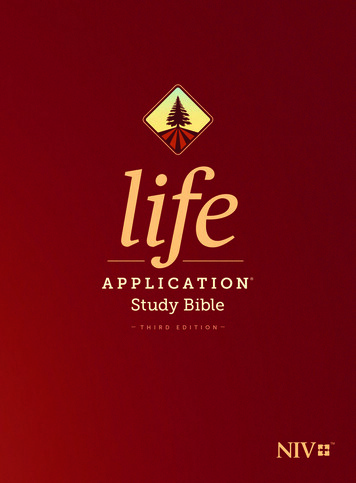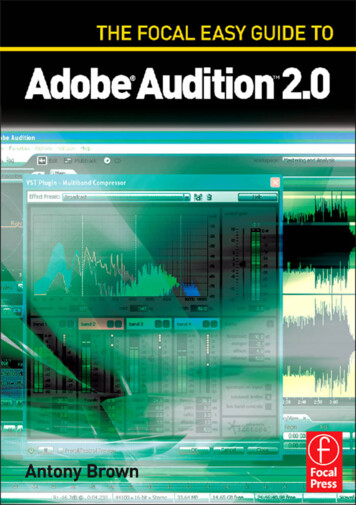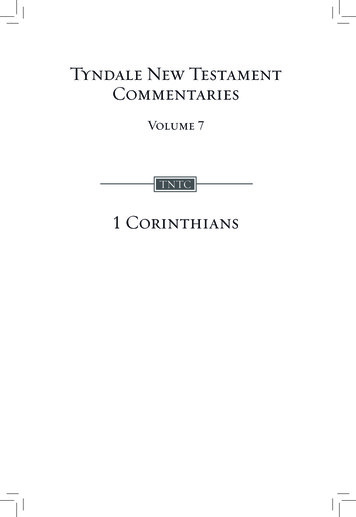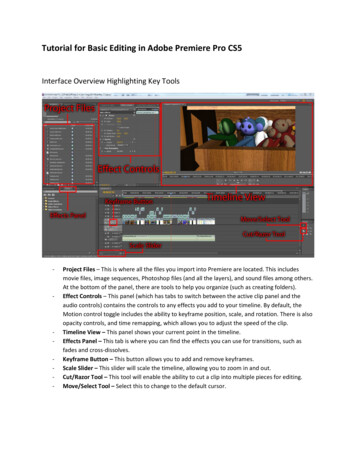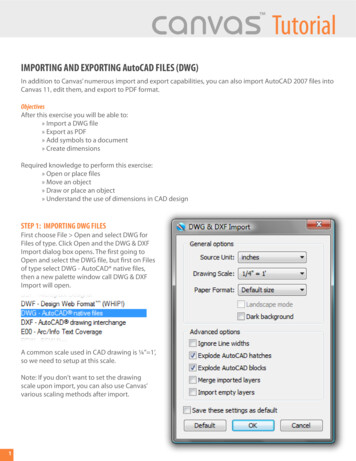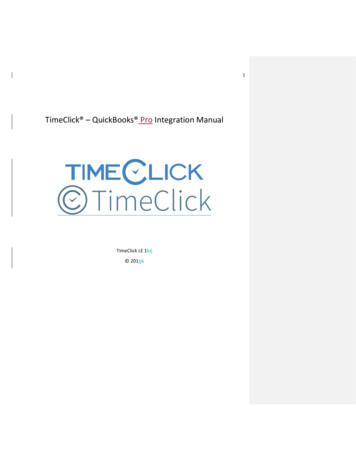
Transcription
A NAVPRESS BIBLE STUDY SERIESA life-changingencounter with God’s WordPHILIPPIANSFind peace and contentmentin perilous times.A NavPress resource published in alliancewith Tyndale House Publishers, Inc.Philippians Repkg LC.indd 112/11/2017 3:40:54 PM
NavPress is the publishing ministry of The Navigators, an internationalChristian organization and leader in personal spiritual development.NavPress is committed to helping people grow spiritually and enjoy livesof meaning and hope through personal and group resources that arebiblically rooted, culturally relevant, and highly practical.For more information, visit www.NavPress.com.PhilippiansCopyright 1997, 2013 by The Navigators. All rights reserved.A NavPress resource published in alliance with Tyndale House Publishers, Inc.NAVPRESS and the NAVPRESS logo are registered trademarks of NavPress, TheNavigators, Colorado Springs, CO. TYNDALE is a registered trademark of Tyndale HousePublishers, Inc. Absence of in connection with marks of NavPress or other parties doesnot indicate an absence of registration of those marks.Logo Flower City font copyright by wubstudio/Creative Market. All rights reserved.Cover photograph of hazy mountaintops copyright Fré Sonneveld/Unsplash.com. Allrights reserved.All Scripture quotations, unless otherwise indicated, are taken from the Holy Bible,New International Version, NIV. Copyright 1973, 1978, 1984, 2011 by Biblica, Inc. Used by permission. All rights reserved worldwide. Scripture quotations marked NASBare taken from the New American Standard Bible, copyright 1960, 1962, 1963, 1968,1971, 1972, 1973, 1975, 1977, 1995 by The Lockman Foundation. Used by permission.Scripture quotations marked RSV are taken from the Revised Standard Version of theBible, copyright 1952 [2nd edition, 1971] by the Division of Christian Education ofthe National Council of the Churches of Christ in the United States of America. Usedby permission. All rights reserved. Scripture quotations marked KJV are taken from theHoly Bible, King James Version.For information about special discounts for bulk purchases, please contact TyndaleHouse Publishers at csresponse@tyndale.com, or call 1-800-323-9400.ISBN 978-0-89109-072-4Printed in the United States of America24 23 22 21 20 19 1837 36 35 34 33 32 31Philippians Repkg LC.indd 212/11/2017 3:40:55 PM
CONTENTSHow to Use This Study5Historical Background — Paul And Philippi9Map of the Roman Empire9Timeline of Paul’s Ministry10One — Overview15Two — A Prayer for Partners (1:1-11)25Three — The Important Thing (1:12-26)35Four — Worthy Conduct (1:27–2:4)43Five — The Mindset of Christ (2:5-11)53Six — Working It Out (2:12-16)61Seven — Co-workers (2:17-30)69Eight — Gains and Loss (3:1-11)75Nine — Citizens of Heaven (3:12–4:1)85Ten — The Peace of God (4:2-23)93Eleven — Review101Going On in Philippians109Study Aids111Philippians Repkg LC.indd 312/11/2017 3:40:55 PM
HOW TO USE THIS STUDYObjectivesMost guides in the LIFECHANGE series of Bible studies cover one book of theBible. Although the LIFECHANGE guides vary with the books they explore,they share some common goals:1. To provide you with a firm foundation of understanding and a thirstto return to the book.2. To teach you by example how to study a book of the Bible withoutstructured guides.3. To give you all the historical background, word definitions, andexplanatory notes you need, so that your only other reference is the Bible.4. To help you grasp the message of the book as a whole.5. To teach you how to let God’s Word transform you into Christ’simage.Each lesson in this study is designed to take sixty to ninety minutes tocomplete on your own. The guide is based on the assumption that you arecompleting one lesson per week, but if time is limited you can do half a lesson per week or whatever amount allows you to be thorough.FlexibilityLIFECHANGE guides are flexible, allowing you to adjust the quantity and depthof your study to meet your individual needs. The guide offers many optionalquestions in addition to the regular numbered questions. The optional questions, which appear in the margins of the study pages, include the following:Optional Application. Nearly all application questions are optional; wehope you will do as many as you can without overcommitting yourself.5Philippians Repkg LC.indd 512/11/2017 3:40:55 PM
IntroductionFor Thought and Discussion. Beginning Bible students should be able tohandle these, but even advanced students need to think about them. Thesequestions frequently deal with ethical issues and other biblical principles.They often offer cross-references to spark thought, but the references do notgive obvious answers. They are good for group discussions.For Further Study. These include: (a) cross-references that shed light ona topic the book discusses, and (b) questions that delve deeper into the passage. You can omit them to shorten a lesson without missing a major pointof the passage.If you are meeting in a group, decide together which optional questionsto prepare for each lesson, and how much of the lesson you will cover at thenext meeting. Normally, the group leader should make this decision, but youmight let each member choose his or her own application questions.As you grow in your walk with God, you will find the LIFECHANGE guidegrowing with you — a helpful reference on a topic, a continuing challenge forapplication, a source of questions for many levels of growth.Overview and detailsThe study begins with an overview of Philippians. The key to interpretation iscontext — what is the whole passage or book about? — and the key to contextis purpose — what is the author’s aim for the whole work? In lesson 1 youwill lay the foundation for your study of Philippians by asking yourself, “Whydid the author (and God) write the book? What did they want to accomplish?What is the book about?”In lessons 2 through 10, you will analyze successive passages ofPhilippians in detail. Thinking about how a paragraph fits into the overallgoal of the book will help you to see its purpose. Its purpose will help you seeits meaning. Frequently reviewing a chart or outline of the book will enableyou to make these connections.In lesson 11, you will review Philippians, returning to the big picture tosee whether your view of it has changed after closer study. Review will alsostrengthen your grasp of major issues and give you an idea of how you havegrown from your study.Kinds of questionsBible study on your own — without a structured guide — follows a progression. First you observe: What does the passage say? Then you interpret: Whatdoes the passage mean? Lastly you apply: How does this truth affect my life?Some of the “how” and “why” questions will take some creative thinking, even prayer, to answer. Some are opinion questions without clear-cutright answers; these will lend themselves to discussions and side studies.Don’t let your study become an exercise in knowledge alone. Treat thepassage as God’s Word, and stay in dialogue with Him as you study. Pray,6Philippians Repkg LC.indd 612/11/2017 3:40:55 PM
PHILIPPIANS“Lord, what do You want me to see here?” “Father, why is this true?” “Lord,how does this apply to my life?”It is important that you write down your answers. The act of writingclarifies your thinking and helps you to remember.Study aidsA list of reference materials, including a few notes of explanation to helpyou make good use of them, begins on page 111. This guide is designed toinclude enough background to let you interpret with just your Bible and theguide. Still, if you want more information on a subject or want to study abook on your own, try the references listed.Scripture versionsUnless otherwise indicated, the Bible quotations in this guide are from theNew International Version of the Bible. Other versions cited are the RevisedStandard Version Bible (RSV), the New American Standard Bible (NASB), andthe King James Version (KJV).Use any translation you like for study, preferably more than one. A paraphrase such as The Living Bible is not accurate enough for study, but it canbe helpful for comparison or devotional reading.Memorizing and meditatingA psalmist wrote, “I have hidden your word in my heart that I might not sinagainst you” (Psalm 119:11). If you write down a verse or passage that challenges or encourages you and reflect on it often for a week or more, you willfind it beginning to affect your motives and actions. We forget quickly whatwe read once; we remember what we ponder.When you find a significant verse or passage, you might copy it onto a cardto keep with you. Set aside five minutes during each day just to think aboutwhat the passage might mean in your life. Recite it over to yourself, exploringits meaning. Then, return to your passage as often as you can during your day,for a brief review. You will soon find it coming to mind spontaneously.For group studyA group of four to ten people allows the richest discussions, but you canadapt this guide for other sized groups. It will suit a wide range of grouptypes, such as home Bible studies, growth groups, youth groups, and businessmen’s studies. Both new and experienced Bible students, and new and7Philippians Repkg LC.indd 712/11/2017 3:40:55 PM
Introductionmature Christians, will benefit from the guide. You can omit or leave for lateryears any questions you find too easy or too hard.The guide is intended to lead a group through one lesson per week.However, feel free to split lessons if you want to discuss them more thoroughly. Or, omit some questions in a lesson if preparation or discussion timeis limited. You can always return to this guide for personal study later. Youwill be able to discuss only a few questions at length, so choose some fordiscussion and others for background. Make time at each discussion formembers to ask about anything they didn’t understand.Each lesson in the guide ends with a section called “For the group.”These sections give advice on how to focus a discussion, how you mightapply the lesson in your group, how you might shorten a lesson, and so on.The group leader should read each “For the group” at least a week ahead sothat he or she can tell the group how to prepare for the next lesson.Each member should prepare for a meeting by writing answers for all ofthe background and discussion questions to be covered. If the group decidesnot to take an hour per week for private preparation, then expect to take atleast two meetings per lesson to work through the questions. Application willbe very difficult, however, without private thought and prayer.Two reasons for studying in a group are accountability and support.When each member commits in front of the rest to seek growth in an areaof life, you can pray with one another, listen jointly for God’s guidance, helpone another to resist temptation, assure each other that the other’s growthmatters to you, use the group to practice spiritual principles, and so on.Pray about one another’s commitments and needs at most meetings. Spendthe first few minutes of each meeting sharing any results from applicationsprompted by previous lessons. Then discuss new applications toward the endof the meeting. Follow such sharing with prayer for these and other needs.If you write down each other’s applications and prayer requests, you aremore likely to remember to pray for them during the week, ask about themat the next meeting, and notice answered prayers. You might want to get anotebook for prayer requests and discussion notes.Notes taken during discussion will help you to remember, follow up onideas, stay on the subject, and clarify a total view of an issue. But don’t letnote-taking keep you from participating. Some groups choose one memberat each meeting to take notes. Then someone copies the notes and distributes them at the next meeting. Rotating these tasks can help include people.Some groups have someone take notes on a large pad of paper or erasablemarker board so that everyone can see what has been recorded.Pages 114–115 lists some good sources of counsel for leading groupstudies.8Philippians Repkg LC.indd 812/11/2017 3:40:55 PM
PHILIPPIANSPAUL AND PHILIPPIHistorical BackgroundMap of the Roman EmpireROMAN EMPIREYALITRomeMACEDONIAPhilippiMEDITERRANEAN SEABLACK SEAASIA MINORThyatiraEphesus TarsusLystraSYRIAAntiochJUDEAJerusalemPaul wrote this note to his friends in Philippi as he sat in a Roman prison,yet the word joy is one of the most frequently used words in the letter. Thereason for Paul’s overflowing joy is found in some even more frequent words:God, Lord, Christ, and Jesus. It is a warm letter of thanks for kindness rendered, yet it contains some of the New Testament’s deepest teaching aboutChrist and the gospel.Saul the PhariseeThe man we call the apostle Paul was born in the first decade AD in Tarsus,a small but prosperous city on the trade route from Syria to Asia Minor.Tarsus was known for its schools of philosophy and liberal arts, and somescholars believe that Paul must have had some contact with these. Like mostcities in the Roman Empire, Tarsus probably contained synagogues of Greekspeaking Jews who were often as devout as their Hebrew-speaking brethren.19Philippians Repkg LC.indd 912/11/2017 3:40:55 PM
IntroductionTimeline of Paul’s Ministry(All dates are approximate, based on F. F. Bruce, Paul: Apostle of the HeartSet Free.)Public ministry of JesusAD 28–30Conversion of Paul (Acts 9:1-19)33Paul visits Jerusalem to see Peter (Galatians 1:18)35Paul in Cilicia and Syria (Galatians 1:21; Acts 9:30)35–46Paul visits Jerusalem to clarify the mission to the Gentiles (Galatians2:1-10)46Paul and Barnabas in Cyprus and Galatia (Acts 13–14)47–48Letter to the Galatians48?Council of Jerusalem (Acts 15)49Paul and Silas travel from Antioch to Asia Minor, Macedonia, andAchaia (Acts 16–17)49–50Letters to the Thessalonians50Paul in Corinth (Acts 18:1-18)50–52Paul visits Jerusalem52Paul in Ephesus (Acts 19)52–55Letters to the Corinthians55–56Paul travels to Macedonia, Dalmatia, and Achaia (Acts 20)55–57Letter to the Romansearly 57Paul to Jerusalem (Acts 21:1–23:22)May 57Paul imprisoned in Caesarea (Acts 23:23–26:32)57–59Paul sent to house arrest in Rome (Acts 27:1–28:31)59–62Letters to Philippians, Colossians, Ephesians, and Philemon60?–62Letters to Timothy and Titus?Paul executed in Rome65?10Philippians Repkg LC.indd 1012/11/2017 3:40:55 PM
PHILIPPIANSHowever, in Philippians 3:5 Paul calls himself “a Hebrew of Hebrews,”which probably means that his parents spoke Hebrew and raised him in a strictJewish home, isolated as much as possible from the pagan city around them.2They named their boy “Saul” after Israel’s first king, the most glorious memberof the Israelite tribe of Benjamin, to which Saul’s parents traced their ancestry(see Philippians 3:5). It was a rare Jew outside Palestine who could trace a purelineage back to the ancient days of Israel, and fellow Jews would have envied thepedigree. Furthermore, Saul’s family must have owned property and had someimportance in the Gentile community as well, for Saul was born not only a citizen of Tarsus (see Acts 21:39) but also a citizen of Rome (see Acts 22:27-28).3Saul was sent to study Jewish law in Jerusalem under the foremostrabbi of his day, the Pharisee Gamaliel (see Acts 22:3; Galatians 1:14). ThePharisees (the Hebrew word means “the separated ones”) felt that God hadset them apart to live by the Torah (the Law, or Teaching, of Moses). Forthem, this meant following the interpretations of the Torah laid down bygenerations of teachers. Some Pharisees held that a man was righteous ifhe had done more good than bad, but Saul apparently followed the strictergroup who insisted that even the least implications of the Law must be kept.4The Pharisees expected a Messiah (Hebrew for “Anointed One”; Greek:Christ), who would deliver them from foreign oppression and rule with justice. However, Jesus of Nazareth had infuriated many Pharisees by interpreting the Law differently and claiming a special relationship with God. Thus,when some Jews began to proclaim Jesus as Messiah and Lord (a term usually reserved for God), strict Pharisees opposed them vehemently.Saul helped to lead the fight against the proclaimers of Christ inJerusalem (see Acts 7:58-8:3; Galatians 1:13). When some were driven out,Saul obtained permission to pursue them to Damascus. But on the way there,Jesus confronted Saul in a blinding encounter (see Acts 9:1-19), revealing toSaul that he was persecuting the very God he professed to worship. From thenon, Saul’s understanding of God and the Torah began to change dramatically.He joined those Jews who were urging other Jews to believe in Jesus, and aftersome years God called him to proclaim Jesus as Savior to the Gentiles also.Saul took the Greek name “Paul” when he turned to work among Gentiles.Paul the missionaryPaul’s conversion may have marked his first move outward from cloisteredJudaism into pagan culture. He spent ten years in the Roman provinces ofCilicia and Syria (see Galatians 1:21), probably preaching Jesus along withHellenistic (Greek-speaking) Jewish Christians who had fled Jerusalemduring the persecution. Then a believer named Barnabas called Paul fromTarsus to Syrian Antioch, where by this time rapid conversions had made thechurch more Gentile than Jewish.5After a while, the church in Antioch commissioned Paul and Barnabas toevangelize the provinces of Cyprus and Galatia. The two men succeeded infounding churches in several cities. Indeed, the mission to the Gentiles wasso successful that the apostles in Jerusalem invited Paul and Barnabas to a11Philippians Repkg LC.indd 1112/11/2017 3:40:55 PM
Introductioncouncil to clarify exactly what God expected of Gentile believers (see Acts 15).Paul asserted that both Gentiles and Jews were reconciled to God by faithin Jesus, apart from keeping the Law, but certain Jewish Christians felt thatGentile converts must keep all the Jewish laws. The council confirmed Paul’sview of the gospel, although some people thought that rejecting the laws asnecessary to salvation would alienate potential Jewish converts. Those opponents remained Paul’s enemies and continued to preach against him.To PhilippiAfter the council in Jerusalem, Paul left Antioch with a new partner, Silas,to revisit the churches Paul had founded in Galatia. In a town called Lystra,they invited a young half-Jewish man — Timothy — to join their missionteam. Along with his mother and grandmother, Timothy had accepted Christduring Paul’s first visit to Lystra, and local church leaders now consideredhim an extremely promising disciple (see Acts 16:1-3; 2 Timothy 1:5).Paul wanted to spend more time in Asia Minor (see the map of the RomanEmpire on page 9), but the Holy Spirit seemed to be guiding them away fromfurther evangelism there. Then Paul had a vision of a man urging him to“come over to Macedonia and help us” (see Acts 16:9). So, the team set outfor the province of Macedonia, north of Greece. The first city they visited wasPhilippi, a Roman colony planted to guard the Roman road across Macedonia.Because it was primarily a military outpost, Philippi contained too fewJews even to have a synagogue, which required ten adult men. Furthermore,Romans were notoriously anti-Semitic — about the time Paul arrived inPhilippi, the Emperor declared Judaism a superstition and expelled all Jewsfrom Rome.6 So, the few Jews and sympathizers met at a “place of prayer”outside the gate of Philippi (see Acts 16:13); they were probably banned frommeeting within the city limits.The Jewish women and Gentile “God-fearers”7 at the prayer placereceived the gospel warmly. Among them was Lydia, an independent businesswoman from Thyatira in Asia. Lydia invited the mission team to stay inher house, and for some weeks the converts continued to meet the missionaries at the prayer place. However, the team ran into trouble with the Romanauthorities when Paul delivered a slave girl from demonic oppression. Herowners, who had been profiting from her ability to prophesy, accused Pauland Silas of disturbing the peace and trying to convert Romans. The city officials had Paul and Silas beaten and imprisoned.That night, an earthquake shook the prison and freed all its prisoners.The jailer accepted Christ because of this miracle, and Paul and Silas agreedto remain in the prison. The next morning, the city magistrates ordered theirrelease, but to protect themselves and future missionaries from similar mistreatment, Paul and Silas informed the officials that they had been treatingRoman citizens like ordinary subjects, and demanded that the officials escortthem out of town to uphold their honor.So, Paul’s mission team was scarcely in Philippi for a few weeks ormonths when they had to leave the fledgling church. The new believers had12Philippians Repkg LC.indd 1212/11/2017 3:40:55 PM
PHILIPPIANSto live in a city where some people had been hurt economically by the missionaries, the magistrates had been embarrassed, and almost everyone wasprejudiced against a supposed Jewish cult. Subtle discrimination and outright persecution were inevitable, yet the church flourished.PartnersThe Philippian Christians remained Paul’s most loyal supporters. They senthim money when he was in Thessalonica, so that he would not have to liveoff the church he was founding there (see Philippians 4:16). Later, when theyheard he was low on funds in Corinth, the Philippians sent money again (see2 Corinthians 11:9). After that, they may have lost track of the apostle foryears, until they heard that he was imprisoned, probably in Rome. It was tenyears since Paul’s first visit to Philippi. He was under arrest in a private house,so he had to pay rent and buy food, but the Christians in Rome would notsupport a missionary accused of an imperial crime. It was not illegal to be aChristian, so prudent people would have kept at arms’ length someone Romesuspected of agitation and treason.When they heard this news, the Philippians sent one of their members,Epaphroditus, to bear a gift of money to Paul and to take care of him whilehe was under arrest. But Epaphroditus became severely ill, and so Paulfelt he should send the man back to Philippi to finish recovering. He sentEpaphroditus with a letter explaining the unexpected return, thanking thePhilippians for their gift, informing them about his circumstances, andexhorting them to respond to their current situation as Christians should.1. A. T. Robertson, “Paul, the Apostle,” The International Standard Bible Encyclopaedia, vol. 4(Grand Rapids, MI: Eerdmans, 1956), 2276.2. F. F. Bruce, Paul: Apostle of the Heart Set Free (Grand Rapids, MI: Eerdmans, 1977),41–43.3. Bruce, 32–40.4. Bruce, 50–52.5. Bruce, 127–133.6. Ralph P. Martin, Philippians (Grand Rapids, MI: Eerdmans, 1976), 5–6.7. Acts 16:14 calls Lydia “a worshiper of God”; the Greek word means literally “God-fearer.”Jews used this term to describe Gentiles who believed in the true God and joined in Jewishworship but did not fully convert and keep the Jewish laws. Because the meeting place iscalled a “prayer place” not a “synagogue,” we infer that there were fewer than ten Jewishmen but an unknown number of Jewish women and God-fearers. Jewish law required tenmen for a “synagogue” but had no rules for a “prayer place.”13Philippians Repkg LC.indd 1312/11/2017 3:40:55 PM
Philippians Repkg LC.indd 1412/11/2017 3:40:55 PM
Lesson OneOVERVIEWThis overview will probably take you more timethan any other lesson of the study. If necessary,allow one week to read the “How to Use This Study”section on pages 5–8, the historical background onpages 9–13, and the whole letter to the Philippians.Then take a second week to answer the overviewquestions.First impressionsThe Philippians had not seen Paul for years. Thenthey heard he was under house arrest, and poorlysupplied with food and other necessities. So,they sent Epaphroditus to take Paul some moneyand care for him during his ordeal. But nowEpaphroditus is back unexpectedly. Surprised tosee their emissary, but glad for news after monthswithout word, the Philippians (if they treated letters as most people do) probably read throughPaul’s epistle quickly at first, searching for the mainpoints and their friend’s state of mind. They probably went back to study the profound words in detaillater, but their first reading was likely to have beenswift and general.In the same way, read through the whole ofPaul’s letter at one sitting. Get a general impressionof his themes and state of mind.15Philippians Repkg LC.indd 1512/11/2017 3:40:55 PM
Lesson OneOptionalApplication:Compare Paul’s moodand the ideas heemphasizes to yourown mood and theissues that preoccupyyou. Is there anythingin Paul’s examplethat you would liketo follow? Talk to Godabout this, and askHim to renew yourthinking (see Romans12:2).1. How would you describe the mood (emotion,state of mind) Paul conveys in this letter? Whatappear to be his attitudes toward his circumstances, the Philippians, other people, himself?For Thought andDiscussion: Whatclues does the lettergive regarding Paul’scircumstances? Thesituation in Philippi?The occasion thatprompted the letter?2. Repetition is a clue to the ideas that are mostimportant in a book. What words and ideas arerepeated in each of the following sets of verses?1:27; 2:2-4; 4:2-31:5,7; 2:25; 4:14-151:4,18,25; 2:2,17-18; 3:1; 4:4,10otherBroad outlineIf your impression of Philippians is vague after onereading, a broad outline can help sharpen it.3. Reread Philippians, preferably in a differenttranslation. (A different version can help younotice new things and can make a confusingpassage clearer.)This time, think of a short phrase or sentencethat can serve as a title for each paragraph. Youmay want to include key words from the paragraph. Write your titles on the next page.16Philippians Repkg LC.indd 1612/11/2017 3:40:55 PM
OVERVIEW(Be creative. There is no one right answer;the first title is given as an example. YourBible’s paragraph divisions may differ, so feelfree to alter those given here.)1:1-2Servants to 113:12–4:14:2-94:10-204:21-2317Philippians Repkg LC.indd 1712/11/2017 3:40:55 PM
Lesson OneFor Thought andDiscussion: Whattitle would you giveto this letter?Theme/purposePeople usually write letters in response to a particular situation in their own or their readers’ lives.They normally have reasons for choosing the topicsthey cover in their letters. It is often not possible toreconstruct exactly what circumstances moved aperson to write, but the more we can reconstruct,the better we will understand the writer’s message.Our own purpose for studying the letter willoften differ from its original purpose, but how weunderstand and apply a writer’s words should beinfluenced by how the Holy Spirit meant them to beunderstood and applied in the first century.4. From your first readings of Philippians, whatseem to be Paul’s chief aims in writing thisletter?5. If you have not already done so, read the historical background on pages 9–13. If you feel thatadditional background would help you to betterinterpret Paul’s letter, you might write downyour questions here. Some of your questionsmay be answered later in this study guide. Thesources in Study Aids on pages 111–115 mayhelp you to answer others.18Philippians Repkg LC.indd 1812/11/2017 3:40:55 PM
OVERVIEW6. In your first readings of Philippians, you mayhave come across questions you’d like answeredas you go deeper into this study. While yourthoughts are still fresh, you may want to jotdown your questions here to serve as personalobjectives for your investigation of the letter.Study Skill — ApplicationJames 1:22 urges us to do what the Word says,not merely listen to it. So, the last step of Biblestudy is asking yourself, “What difference shouldthis passage make in my life? How should itmake me want to think or act?” Application willrequire time, thought, prayer, and perhaps evendiscussion with another person.At times, you may find it most productiveto concentrate on one specific application,giving it careful thought and prayer. At othertimes, you may want to list many implications apassage of Scripture has for your life, and thenchoose one to concentrate on for prayer andaction. Use whatever method helps you growmore obedient to God’s Word.OptionalApplication:a. If you were inprison, what kind ofletter would you writeto your friends? Whatwould you talk about?How would yourtopics and feelings belike and unlike thosePaul expresses?b. Ask God togive you Paul’s attitudes toward prison,life, enemies, and soon. Be specific abouthow you want tochange.7. You have been reading Philippians as just anordinary ancient letter, but it is also God’sWord to us today. Does your first reading ofPhilippians suggest any areas in which it mightapply to you? If so, what are some of those areas?19Philippians Repkg LC.indd 1912/11/2017 3:40:55 PM
Lesson OneFor the groupThis “For the group” section and the ones in laterlessons are intended to suggest ways of structuringyour discussions. Feel free to select and adapt whatsuits your group. The main goals of this lesson areto get to know the book of Philippians as a wholeand the people with whom you are going to study it.Worship. Some groups like to begin with prayerand/or singing. Some share requests for prayer atthe beginning, but leave the actual prayer untilafter the study. Others prefer just to chat and haverefreshments for a while and then move to thestudy, leaving worship until the end.Warm-up. The beginning of a new study is a goodtime to lay a foundation for honest sharing of ideas,to get comfortable with each other, and to encourage a sense of common purpose. One way to establish common ground is to talk about what eachgroup member hopes to get out of your group — outof your study of Philippians, and out of any prayer,s
To teach you by example how to study a book of the Bible without structured guides. 3. To give you all the historical background, word definitions, and explanatory notes you need, so that your only other reference is the Bible. 4. To help you grasp the message of the book as a whole. 5. To teach you how to let Go

